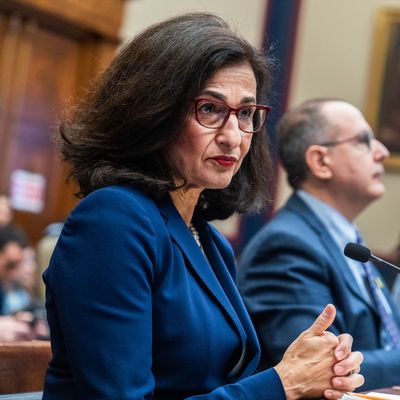

Nemat Shafik, president of Columbia University, testifies during the House Education and the Workforce Committee hearing titled “Columbia in Crisis: Columbia University’s Response to Antisemitism,” in the Rayburn Building on Wednesday, April 17, 2024.
Photo: Tom Williams/CQ-Roll Call, Inc via Getty Images
Embattled Columbia University president Nemat Shafik announced Wednesday that she would be resigning effective immediately after a year of turmoil that saw the storied Ivy League institution at the center of a political firestorm following months of student protests on campus.
“This period has taken a considerable toll on my family, as it has for others in our community. Over the summer, I have been able to reflect and have decided that my moving on at this point would best enable Columbia to traverse the challenges ahead,” Shafik wrote in a letter to the university community. “I am making this announcement now so that new leadership can be in place before the new term begins.”
Katrina Armstrong, the chief executive officer of the Columbia University Irving Medical Center, will succeed Shafik as interim president. Shafik’s tenure of 13 months and 13 days makes her the shortest serving president since the 1800s, according to the Columbia Daily Spectator.
On-campus tensions began to grow following Hamas’s attacks on October 7, 2023, and Israel’s subsequent war in Gaza. Shafik’s leadership of Columbia began to come under scrutiny after the school suspended two pro-Palestinian groups and as concerns grew about a lack of support and safety for both Jewish and Muslim students as protests began in earnest. As months went on, Shafik was strongly criticized for her decision to call for the NYPD to clear out student encampments on campus in April, resulting in mass arrests. Columbia’s protests came to a head at the end of the month as a group of students occupied Hamilton Hall, a university building with a history as a site of student activism, and held the building until law enforcement took back the building by force and arrested dozens. The level of unrest would result in Columbia canceling its yearly campuswide commencement ceremony, citing concerns about security.
Though she would testify herself at a later date, Shafik did not take part in the heavily discussed House education committee hearing on campus antisemitism held late last year. That hearing included Shafik’s peer Liz Magill, the president of the University of Pennsylvania, who would go on to resign from her position following the backlash she received from her responses at the hearing. Harvard University president Claudine Gay, who also testified that day, would later step down from her role due to lingering doubts in how the school addressed antisemitism as well as accusations of plagiarism.
For her next steps, Shafik will return to the United Kingdom after being asked by the nation’s foreign secretary to “chair a review of the government’s approach to international development and how to improve capability.” Prior to her time at Columbia, Shafik served as the president and vice-chancellor of the London School of Economics and Political Science.
Shafik’s news comes as the effects from the previous semester’s unrest continue to reverberate on campus. Last week, three Columbia deans resigned due to a series of text-message exchanges that the school said “touched on ancient antisemitic tropes.” Ahead of the start of the new school year in September, Columbia announced that campus access would now be restricted only to those with a campus ID and specific entry points until further notice.
Source link




